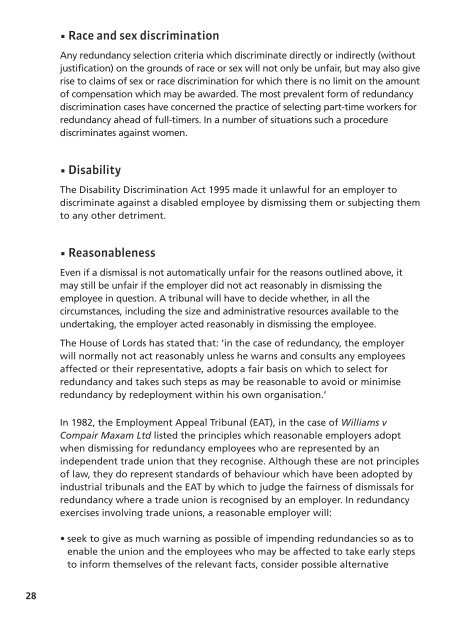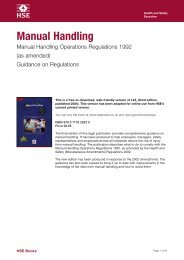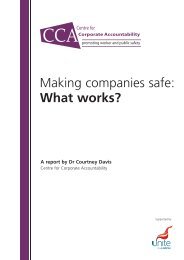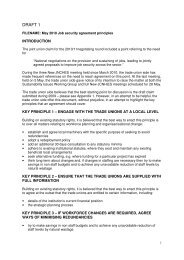Redundancy - Unite the Union
Redundancy - Unite the Union
Redundancy - Unite the Union
Create successful ePaper yourself
Turn your PDF publications into a flip-book with our unique Google optimized e-Paper software.
• Race and sex discrimination<br />
Any redundancy selection criteria which discriminate directly or indirectly (without<br />
justification) on <strong>the</strong> grounds of race or sex will not only be unfair, but may also give<br />
rise to claims of sex or race discrimination for which <strong>the</strong>re is no limit on <strong>the</strong> amount<br />
of compensation which may be awarded. The most prevalent form of redundancy<br />
discrimination cases have concerned <strong>the</strong> practice of selecting part-time workers for<br />
redundancy ahead of full-timers. In a number of situations such a procedure<br />
discriminates against women.<br />
• Disability<br />
The Disability Discrimination Act 1995 made it unlawful for an employer to<br />
discriminate against a disabled employee by dismissing <strong>the</strong>m or subjecting <strong>the</strong>m<br />
to any o<strong>the</strong>r detriment.<br />
• Reasonableness<br />
Even if a dismissal is not automatically unfair for <strong>the</strong> reasons outlined above, it<br />
may still be unfair if <strong>the</strong> employer did not act reasonably in dismissing <strong>the</strong><br />
employee in question. A tribunal will have to decide whe<strong>the</strong>r, in all <strong>the</strong><br />
circumstances, including <strong>the</strong> size and administrative resources available to <strong>the</strong><br />
undertaking, <strong>the</strong> employer acted reasonably in dismissing <strong>the</strong> employee.<br />
The House of Lords has stated that: ‘in <strong>the</strong> case of redundancy, <strong>the</strong> employer<br />
will normally not act reasonably unless he warns and consults any employees<br />
affected or <strong>the</strong>ir representative, adopts a fair basis on which to select for<br />
redundancy and takes such steps as may be reasonable to avoid or minimise<br />
redundancy by redeployment within his own organisation.’<br />
In 1982, <strong>the</strong> Employment Appeal Tribunal (EAT), in <strong>the</strong> case of Williams v<br />
Compair Maxam Ltd listed <strong>the</strong> principles which reasonable employers adopt<br />
when dismissing for redundancy employees who are represented by an<br />
independent trade union that <strong>the</strong>y recognise. Although <strong>the</strong>se are not principles<br />
of law, <strong>the</strong>y do represent standards of behaviour which have been adopted by<br />
industrial tribunals and <strong>the</strong> EAT by which to judge <strong>the</strong> fairness of dismissals for<br />
redundancy where a trade union is recognised by an employer. In redundancy<br />
exercises involving trade unions, a reasonable employer will:<br />
• seek to give as much warning as possible of impending redundancies so as to<br />
enable <strong>the</strong> union and <strong>the</strong> employees who may be affected to take early steps<br />
to inform <strong>the</strong>mselves of <strong>the</strong> relevant facts, consider possible alternative<br />
28

















